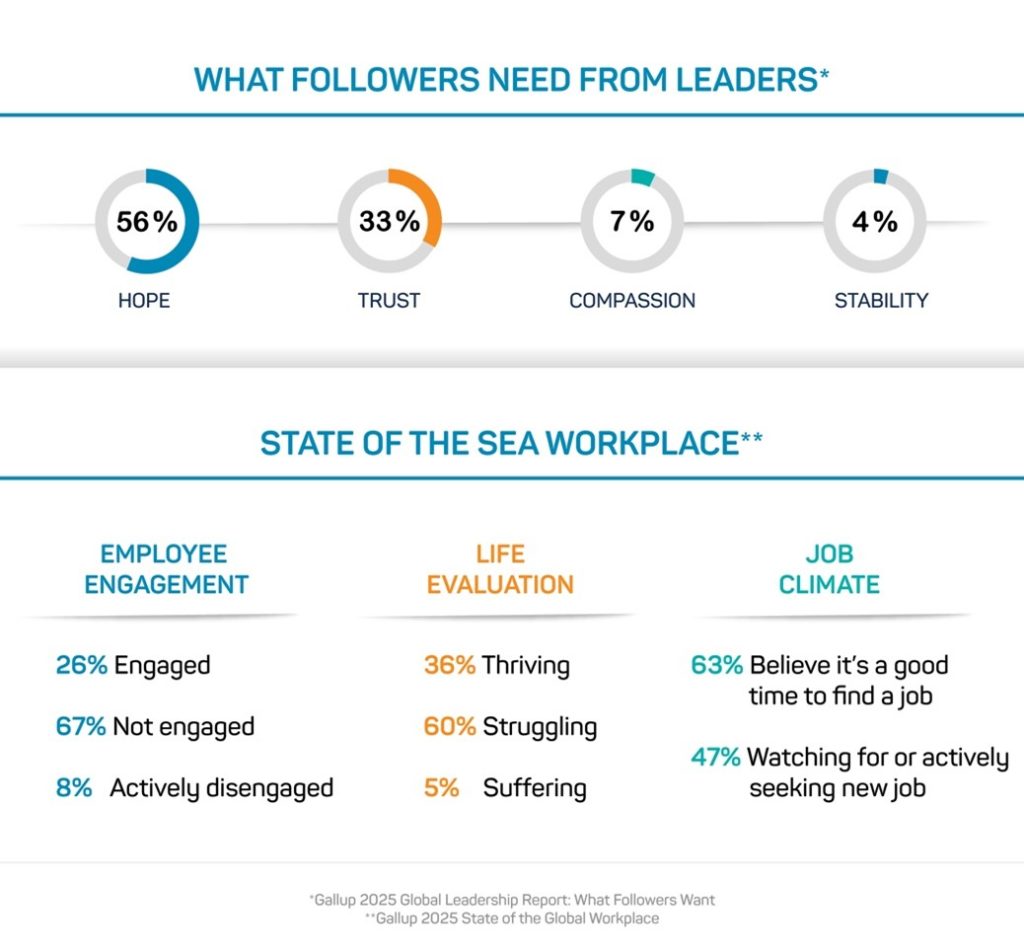
Building Better Leaders: Tips on Modern Leadership in the Southeast Asian Workplace
Leadership in Southeast Asia has historically focused on hierarchy and guidance. While effective in maintaining harmony, this approach often struggles to meet the evolving expectations of a more independent, purpose-driven workforce. According to Gallup’s “2025 Global Leadership Report: What Followers Want”, more emotionally intelligent leaders are in demand now – those who offer hope, build trust, and foster compassion and stability.
In Gallup’s “2025 State of the Global Workplace” report, today’s managers are navigating a complex workplace landscape shaped by post-pandemic realities. On one hand, they face leadership directives to cut costs and restructure teams after high turnover and disrupted operations. On the other, employees expect flexible work options and more consideration for work-life balance. Managers are now struggling to reconcile both sides, often at the cost of their own bandwidth and wellbeing. This, in turn, has impacted the engagement of both managers and employees.

For today’s leaders, the challenge lies in balancing tradition with transformation. This means understanding what their teams need, embracing their own unique strengths, and redefining roles to prioritise coaching and collaboration. As workplace dynamics continue to shift, it’s time for leadership models to do the same.
Here are 10 leadership styles that resonate with the region’s diverse cultural and professional contexts.
1. Servant Leadership
Rooted in humility and service, servant leaders consider the needs and growth of their teams. This people-first approach encourages trust, empathy, and long-term loyalty – values that align closely with Southeast Asia’s collectivist culture, where harmony and group wellbeing are emphasised.
2. Adaptive Leadership
In a region marked by diversity and rapid change, adaptive leadership helps organisations stay resilient. This style focuses on navigating uncertainty by encouraging experimentation, learning from setbacks, and involving teams in solving complex challenges – a natural fit for Southeast Asia’s changing business landscapes.
3. Collaborative Leadership
Collaboration thrives in cultures that value community and shared success. This leadership style puts emphasis on cross-functional teamwork, open dialogue, and collective decision-making to help build cohesion and maintain mutual accountability.
4. Coaching Leadership
Coaching leaders invest in their teams’ growth by acting as mentors and guides rather than traditional authority figures. By encouraging skill development and personal ownership, this approach supports Southeast Asia’s younger workforce, which places increasing value on mentorship and career advancement.

5. Transformational Leadership
Transformational leaders inspire teams through vision, motivation, and personal connection. They drive innovation and challenge the status quo while fostering a shared sense of purpose – an effective approach in Southeast Asia, where respect, guidance, and collective goals are highly valued.
6. Inclusive Leadership
In Southeast Asia’s culturally rich and diverse societies, inclusive leadership is crucial. These leaders create environments where all voices are respected and valued, ensuring that diverse perspectives contribute meaningfully to decision-making and idea generation.
7. Digital Leadership
With technology reshaping how we work, digital leadership is more important than ever. Effective digital leaders embrace new technologies, drive digital transformation, and lead with clarity and efficiency to stay competitive in the global market.8. Purpose-Driven Leadership
Modern employees, especially Gen Z and Millennials, want to work for organisations that contribute positively to society. Purpose-driven leaders connect business outcomes with broader social impact, reflecting Southeast Asia’s deep-rooted values around social harmony and meaningful work.
8. Purpose-Driven Leadership
Modern employees, especially Gen Z and Millennials, want to work for organisations that contribute positively to society. Purpose-driven leaders connect business outcomes with broader social impact, reflecting Southeast Asia’s deep-rooted values around social harmony and meaningful work.

9. Authentic Leadership
Authentic leaders build credibility by being genuine, transparent, and grounded in their values. In relationship-oriented cultures like those in Southeast Asia, this honesty fosters trust, deepens engagement, and strengthens the leader-follower bond.
10. Empathetic Leadership
Empathetic leaders connect with their teams by understanding their emotions, challenges, and aspirations. In Southeast Asia where strong interpersonal connections are central to the workplace, this approach enhances morale, loyalty, and team cohesion.
The C-suite recruitment experts
More businesses are looking for leaders who care about people as much as performance. Leadership today is about guiding others, not just giving orders.
At ASW Consulting, a reliable recruitment agency in Thailand and Vietnam, we specialise in identifying these dynamic leaders. Whether you’re seeking a visionary CEO or a transformational department head, our talent acquisition specialists in Bangkok and Ho Chi Minh City have the expertise and insight in finding leaders who truly fit your company’s direction. We take the time to understand your needs—and your people.
Get in touch with our headhunting company in Thailand and Vietnam to start a conversation. We’re here to support you in finding leaders who make a positive impact on your business and your people.
Related blogs:
How to Attract Top Talent in Southeast Asia’s Competitive Job Market
Thriving Through Change: A Guide for Thai Professionals
Top 12 Tips on How to Transition into a New Career in Vietnam



